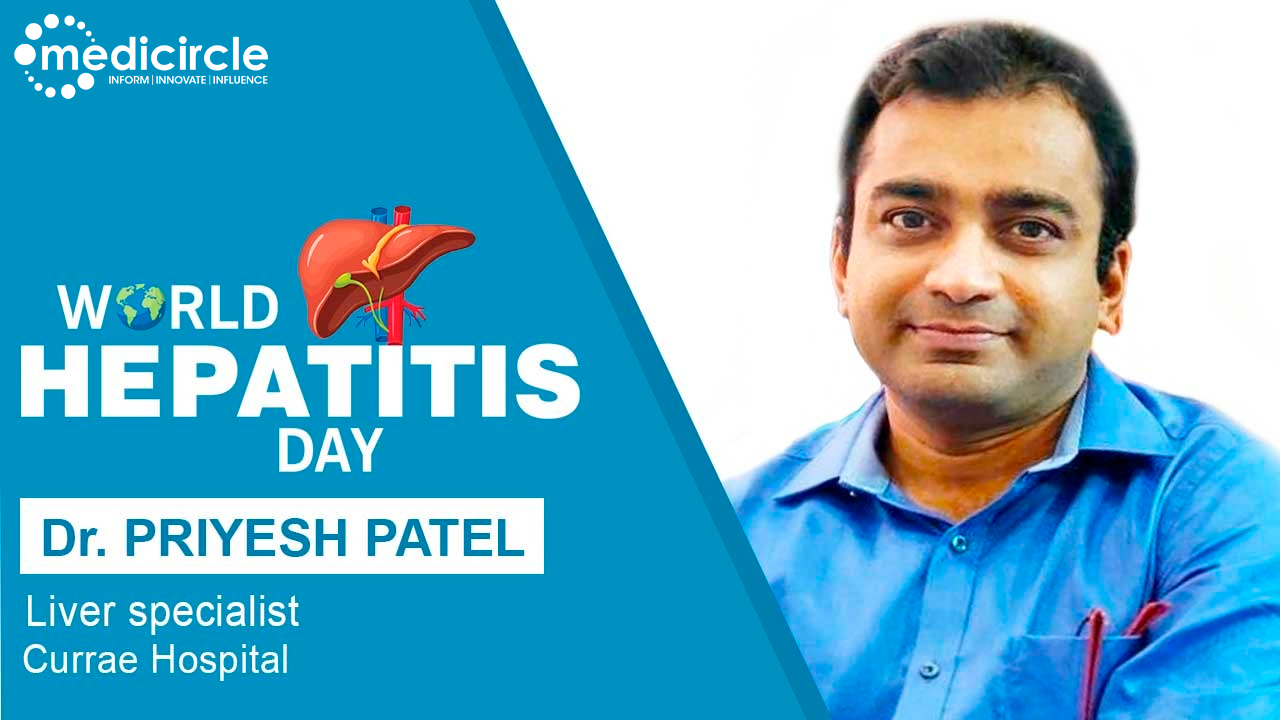According to WHO, Hepatitis is an inflammation of the liver that can cause a range of health problems and an estimated 325 million people worldwide live with hepatitis B or C. For most people, testing and treatment remain beyond reach. Medicircle is conducting a Hepatitis Awareness Series on the occasion of Hepatitis Awareness Month to spread information amongst people about the significance of testing for hepatitis, the availability of effective care and curative treatment, and the serious health consequences resulting from undiagnosed and untreated viral hepatitis.
Dr. Priyesh Patel is a Gastroenterologist and Hepatologist. He currently practices in Currae hospitals and Fortis Hospital in Mumbai. He has special expertise in preventing hepatological diseases and is an expert in the cure of liver diseases. He is well trained and an expert in diagnostic and therapeutic endoscopic procedures and has done many successful endoscopic surgeries.
Difference between Hepatitis A, B, C
Dr.Priyesh Patel says, “The main difference between the hepatitis A, B, C are:
Structural pathology Mode of transmission Severity of disease Duration of disease
Hepatitis A is usually a food and waterborne disease which is seasonal and commonly seen in adults and children. The most common form of hepatitis in India is hepatitis A which is mainly due to contaminated food and water.
Hepatitis B and C are chronic virus diseases. There are three modes of transmission:
From pregnant mother to child Physical relation between individuals Blood transfusion Infected needles of IV abuses
Hepatitis A is self-limiting and gets better on its own. It is not life-threatening.
Hepatitis B and C is a life-threatening and chronic type of hepatitis without any warning signals. It damages the liver gradually. The signs and symptoms are very late. Hepatitis B and C need life-long treatment.
Vaccinations for Hepatitis
Dr.Patel says, “Hepatitis A is self-limiting and Hepatitis B or Ci is a majorly chronic form of hepatitis. Prevention is better than cure. Hepatitis A and B have vaccinations available. While hepatitis C and E have no vaccinations available. Hepatitis A is optional vaccination as it is self-limiting and is not recommended for everyone. Hepatitis B is a compulsory vaccine for newborn babies as per the Indian Government. Hepatitis B vaccination should be taken by adults as well. There are 3 doses of hepatitis B vaccine which must be taken intramuscularly with a sequence of 0,1,6 which means the first dose on the 1 st day followed by the 2nd dose after 1 month and the third dose after 6 months. Usually, three doses of the hepatitis vaccine are enough. This is a very safe vaccination without any complications which can be taken at any age.
Hepatitis C and E has no vaccines available unfortunately
Reasons behind aggravation of hepatitis
Dr. Patel informs, “Hepatitis =Hep +itis. Here hepa= liver and itis= swelling or inflammation. The main causes of liver inflammation which can damage the liver is :
Viral hepatitis like hepatitis C, A, E Alcohol Uncontrollable diabetes Uncontrolled Cholesterol Lack of physical activity”
Covid and hepatitis
Dr. Patel informs, “Hepatitis and covid related hepatitis needs a constant watch and further research. We are well informed about covid data and guidelines. There is no direct correlation between hepatitis and covid. People suffering from chronic hepatitis B and C can take the covid vaccine safely. Covid also affects other systems and being a viral infected disease, it is a multisystem disease. Covid reduces the immunity of the individual which may further aggravate a health problem.”
(Edited by Dr.Rati Parwani)

 Dr. Priyesh Patel informs about the difference between the chronicity of hepatitis and also informs about the spread of the disease which can be controlled with vaccination. He gives an overview of the importance of hepatitis vaccination and its safety
Dr. Priyesh Patel informs about the difference between the chronicity of hepatitis and also informs about the spread of the disease which can be controlled with vaccination. He gives an overview of the importance of hepatitis vaccination and its safety





.jpeg)
.jpeg)

.jpeg)
.jpeg)
_(1)_(1)_(1).jpeg)
_(1).jpeg)
.jpeg)

.jpeg)





.jpeg)

.jpeg)

.jpeg)
.jpeg)

.jpeg)




